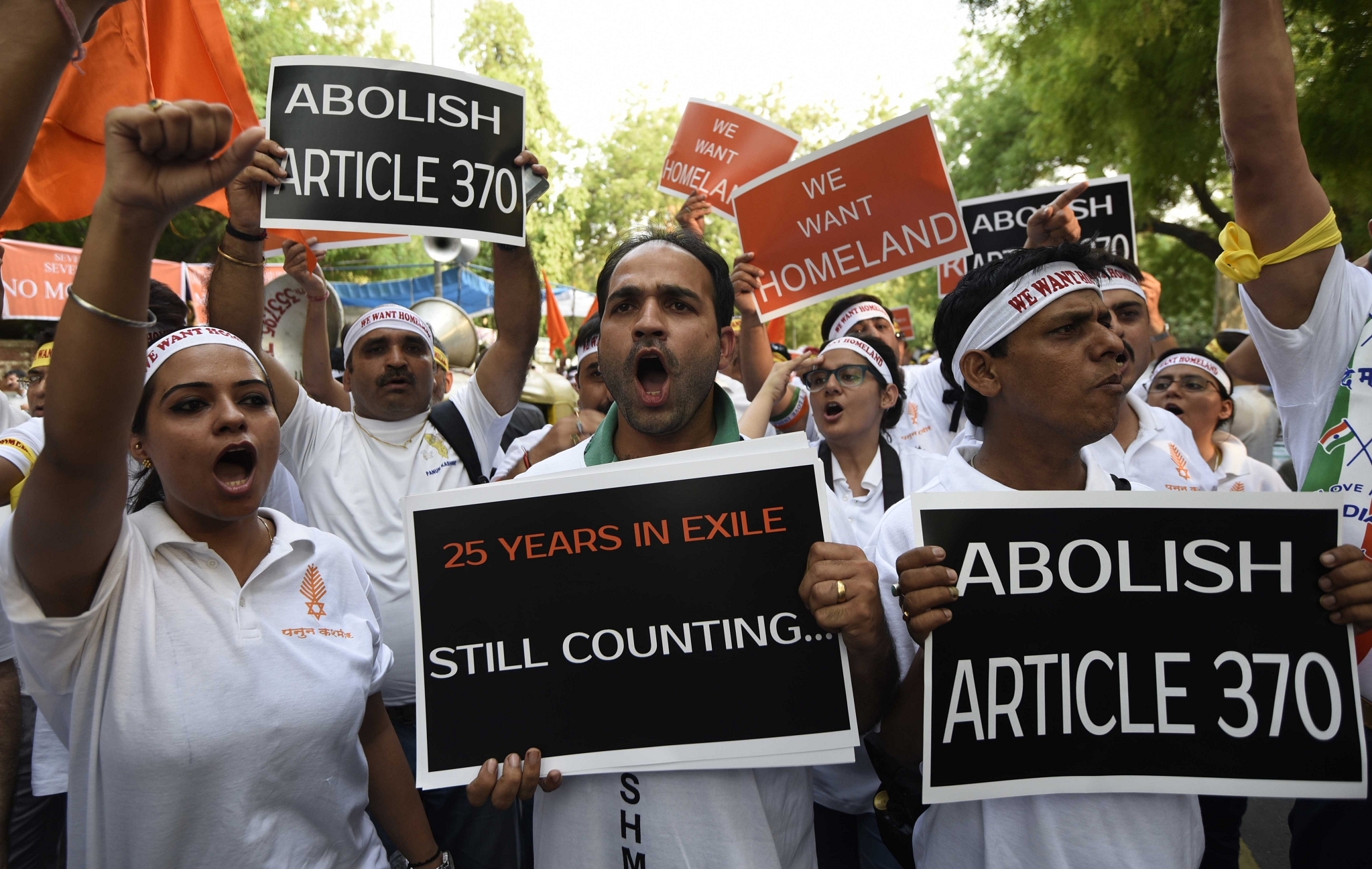Politics
Sorry Chidu, J&K’s Record On Ethnic Cleansing Shows It Deserves Less Autonomy, Not More
- Given the overwhelming failure of all J&K governments so far to act in a secular way, the case for more autonomy to the state fails the test of fairness and good intent.
- J&K cannot be a special case where other Indian states get treated like second-class powers.

Kashmiri Pandits protesting (Vipin Kumar/Hindustan Times via Getty Images)
P Chidambaram, former home minister of India, has now taken it upon himself to be the official interpreter of the Kashmir Valley’s political aspirations, including demands for greater autonomy.
This is what he said the other day. “My interactions with J&K led to the conclusion that when they asked for 'azadi', most of them, not all, but an overwhelming majority, wanted autonomy. Therefore, I think we should seriously examine that question.” He added: "J&K will remain an integral part of India but it will have larger powers as promised under Article 370.”
While, at the superficial level, this statement is not out of bounds for any Indian political party, since talks with Kashmiris often amount to figuring out what kind of additional powers the state should get in order to buy peace, the questions that Chidambaram really needs to answer are the following:
First, why should a state that drove almost its entire minority population out through violence and rape get more powers? To complete the ethnic cleansing, the parts that still stubbornly remain in the Valley? Or, maybe, to begin a pogrom against the Shias and Buddhists?
Second, even if we assume that for most people in the Valley “azadi” means more autonomy, why is it that we must listen to this majoritarian demand when Jammu & Kashmir has two other regions, Jammu and Ladakh, which, in fact, may be happier with “azadi” from Kashmiri hegemony, and may even prefer stronger ties with the rest of India? Why must the whole of J&K suffer for the Valley’s xenophobia?
Third, why should Jammu & Kashmir get more autonomy when no other major Indian state gets it? Why should the majority of Indian states be second-class powers within the Indian Union, when Kashmir alone will get favoured treatment? If Chidambaram were to argue for more devolution of powers to all states, that’s fine. India cannot be ruled from Delhi. Otherwise, it is just meaningless rhetoric and appeasement. It sends the message that more autonomy depends on violence and aggression on the part of majoritarian groups.
Fourth, before we even talk of more powers to J&K in the context of greater devolution of powers to all states, does not Kashmir have to reverse the slide into jihadism that has made half a million Pandits exiles in their own land? Secularism is a fundamental tenet of the Indian constitution, and we keep hearing about majoritarian tendencies in the rest of India. But in the one state where majoritarianism has ruled the roost, why should we reward bad behaviour by granting it greater autonomy? Should not the demand for more autonomy be linked to the Valley bringing back the Pandits with grace and honour as a precondition?
Given the overwhelming failure of all J&K governments so far to act in a secular way, the case for more autonomy to the state fails the test of fairness and good intent. The case for reducing the powers of the J&K government is stronger now than the case for granting it more autonomy.
But the larger point is this: J&K cannot be a special case where other Indian states get treated like second-class powers.
Support Swarajya's 50 Ground Reports Project & Sponsor A Story
Every general election Swarajya does a 50 ground reports project.
Aimed only at serious readers and those who appreciate the nuances of political undercurrents, the project provides a sense of India's electoral landscape. As you know, these reports are produced after considerable investment of travel, time and effort on the ground.
This time too we've kicked off the project in style and have covered over 30 constituencies already. If you're someone who appreciates such work and have enjoyed our coverage please consider sponsoring a ground report for just Rs 2999 to Rs 19,999 - it goes a long way in helping us produce more quality reportage.
You can also back this project by becoming a subscriber for as little as Rs 999 - so do click on this links and choose a plan that suits you and back us.
Click below to contribute.
Latest